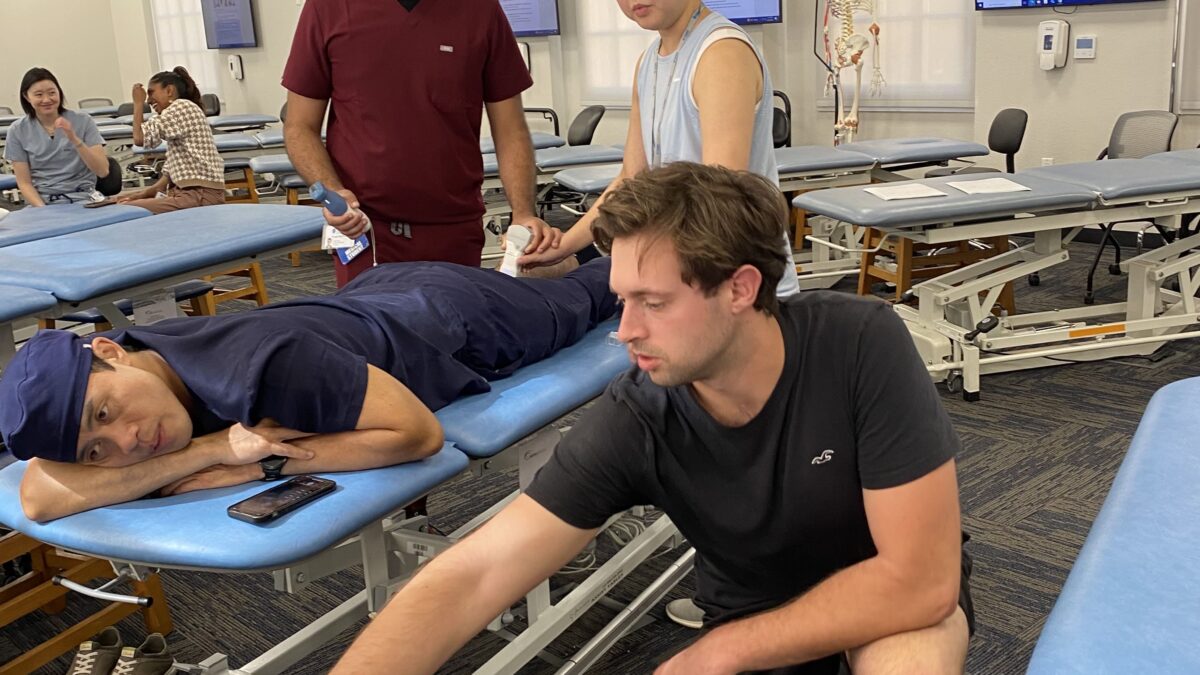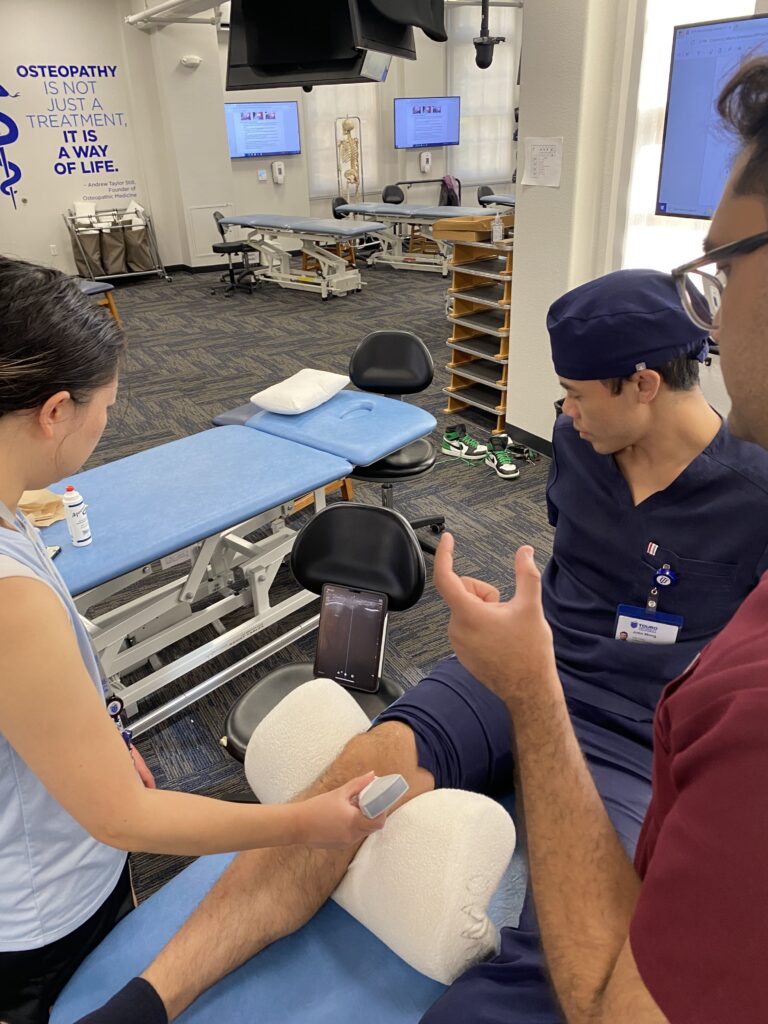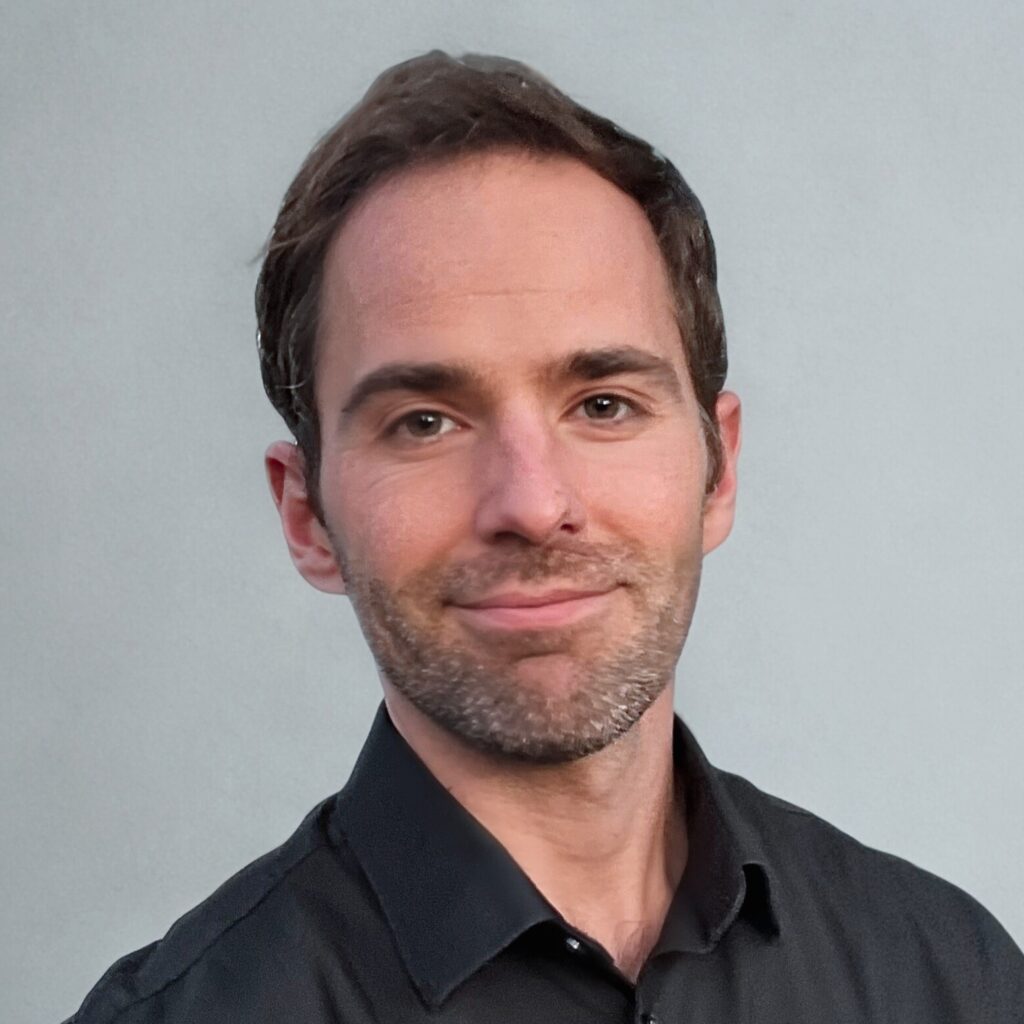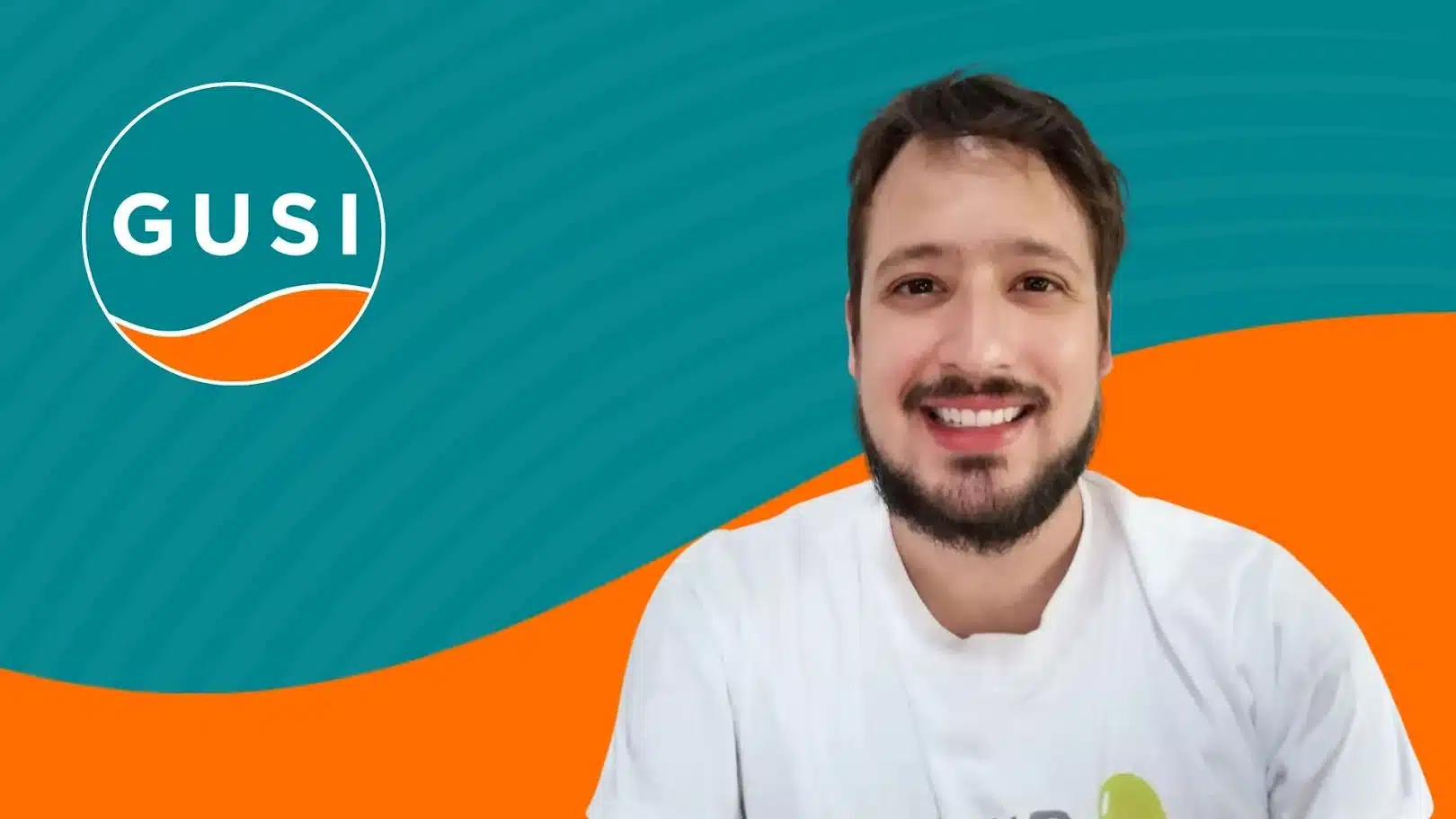In a small practice room at Touro University California, a medical student places an ultrasound probe on a classmate’s knee. He begins to guide his peer through finding the correct anatomical view. But there’s a catch: he can’t touch the probe, can’t adjust the angle himself, can’t demonstrate with his hands. For the next 15 minutes, he must rely entirely on words—clear, precise language that translates the three-dimensional image in his mind into teachable instructions his partner can follow.
This is a Scan Sprint, a GUSI MedConnect innovation, and it’s how students are training the next generation of ultrasound educators.
Training Medical Students as POCUS Educators
As GUSI recently hosted its Flagship Point-of-Care Ultrasound Course in San Francisco, a cohort of medical students and early-career clinicians mastered something more challenging than ultrasound technique itself: how to teach it.
Through GUSI MedConnect—a student-built platform created by students, for students, supported by the Global Ultrasound Institute—participants aren’t just learning to scan—they’re learning to instruct. MedConnect serves as the student arm of GUSI, connecting medical students nationwide with the institute’s world-class educational resources and expert faculty. Many participants have already completed hundreds of supervised scans across multiple POCUS modalities, mastering general and MSK imaging—the kind of systematic, hands-on training that wasn’t widely available in most medical curricula until recently.
At the flagship course, these trainees served as table trainers, working one-on-one with small groups of licensed physicians to deliver hands-on POCUS education.
“Being a part of GUSI MedConnect has been an amazingly rewarding experience,” said Anish Wadhwa, OMS-3. “Not only have I been able to further develop my techniques for various scans, I’ve been able to be a part of an initiative whose goal is to connect health care professionals and help bring point of care ultrasound to communities that lack access to this level of diagnostic capability.”
Scan Sprints: Where Expertise Meets Teaching Excellence
In the weeks leading up to the San Francisco event, MedConnect teams launched intensive Scan Sprints—focused, peer-led sessions where already-proficient scanners refine the harder skill of verbal instruction. The format is simple: one student demonstrates a scan, then guides a novice learner to perform it using only words—no hands-on repositioning.
For students who can independently obtain diagnostic-quality images across multiple POCUS protocols, the challenge isn’t the scanning—it’s the teaching. How do you translate spatial awareness into words? How do you correct technique without taking over the probe? By repeatedly cycling through the instructor role, MedConnect participants develop the communication strategies, real-time feedback techniques, and adaptive teaching methods that distinguish excellent educators from competent practitioners.
Jack Russek, OMS-2, recalls the vulnerability inherent in the teaching process: “Teaching isn’t easy, and it’s vulnerable to stand in front of others and try to pass on something as hands-on as ultrasound. But I trusted the work I’d done and the hours I’d put in. I especially leaned on everything I’ve learned from Jori and Anish. Their approaches to teaching MSK ultrasound are so clear and well-structured, and having that framework along with the strong foundation provided by GUSI gave me multiple solid pillars to lean on when guiding others.”
From Student to Educator: How POCUS Becomes the Great Equalizer
At the recent Flagship POCUS Course, GUSI’s physician educators worked alongside MedConnect trainees to deliver instruction to clinicians from diverse specialties and practice settings. Because widespread adoption of handheld ultrasound technology and systematic point-of-care integration are relatively recent developments, many experienced clinicians are seeking formal POCUS training to add this diagnostic tool to their practice—creating an opportunity for extensively trained students to contribute meaningfully to physician education.
Trainees stepped into the role of table trainers, guiding small groups through hands-on scanning sessions using the verbal teaching methods they’d refined in Scan Sprints. For Russek, the progression from first-year observer to second-year instructor demonstrated the accelerated competency development possible through intensive, focused training. “I still remember attending the GUSI symposium as a first-year med student. At the time, the idea of table training at a future course felt totally out of reach. But standing there in my second year, actually guiding others through scans, was a surreal moment.”
Trainees earn their teaching roles through rigorous preparation, extensive hands-on practice, and demonstrated competency across the full spectrum of POCUS applications. “Moving through the modeling process and becoming a junior trainer for the courses, I’ve seen first-hand how GUSI’s primary goal is to help health care practitioners become comfortable integrating POCUS into their regular practice,” said Wadhwa.
The result is a collaborative learning environment where physicians acquire practical ultrasound skills, trainees develop teaching expertise, and both groups benefit from shared knowledge exchange in this rapidly evolving field.
The Instructor Pathway and National Network
While GUSI provides the expert faculty, educational framework, and flagship courses, GUSI MedConnect serves as the student-driven engine that powers peer-to-peer learning and leadership development. This student-built platform bridges academic and professional communities, uniting osteopathic and allopathic medical students, PAs, and residents across the country with GUSI’s world-class instructor network. Some members who began their journey as medical students have now advanced into residency, carrying their teaching expertise and POCUS proficiency into the next phase of their careers. Through structured mentorship and data-driven reflection, participants evolve from learners into leaders.
The platform offers multiple pathways for engagement and leadership, including a structured instructor pathway that allows participants to progressively develop their teaching expertise. Members begin as scanning models at GUSI courses, gaining exposure to expert instruction and course flow. As they build proficiency, they advance to table trainers, working directly with small groups of physician learners. The most advanced participants can progress to serve as course instructors, delivering didactic sessions and leading educational components alongside GUSI’s physician faculty.
Building Educational Resources and Community Impact
Beyond teaching roles, members collaborate with leading ultrasound educators across institutions through a supportive mentorship network. Many are already co-creating POCUS guidebooks and educational resources that are being distributed globally, contributing to the democratization of ultrasound education worldwide.
The mission is clear: empower medical students to teach, lead, and elevate ultrasound education worldwide—blending mentorship, innovation, and community. MedConnect is built by students, for students, creating a peer-driven movement where students become educators who can transform how POCUS is taught and integrated into clinical practice.
Teaching as the Highest Form of Learning
The pedagogical principle that teaching reinforces learning is well-established in medical education. GUSI MedConnect demonstrates something additional: that teaching itself is a clinical skill worth cultivating from the earliest stages of training. By developing trainees as educators—not just future practitioners—the program creates a multiplier effect. The act of teaching POCUS accelerates participants’ own mastery, building the kind of deep competency and clinical reasoning that translates directly to clinical practice. Many former MedConnect instructors have now transitioned into residency programs, bringing both advanced ultrasound proficiency and the teaching expertise to elevate their colleagues and programs.
Every graduate becomes a force multiplier in an expanding network of ultrasound literacy, capable of training peers, mentoring the next cohort, and advancing how point-of-care diagnostics are taught and practiced.
For Russek, the impact extends beyond technical competency: “This has easily been one of the most meaningful experiences of my medical school journey so far. It’s the first time I’ve felt like I truly own a skillset, not just for myself, but in a way that I can actually share with others. That’s a rare feeling as a preclinical med student. GUSI and MedConnect gave me that and enabled me to succeed in a way not otherwise common in these early years of education.”
He adds: “I really hope more students take the opportunity to get involved. This kind of training doesn’t just teach you ultrasound—it provides a framework for integrating anatomy and physiology knowledge into practical diagnostic skills from the early stages of medical education.”
Join the Movement
For medical students passionate about POCUS, mentorship, and the future of medicine, GUSI MedConnect offers a unique opportunity to develop not just clinical skills, but the teaching expertise that will define the next generation of medical education.
Whether you’re interested in mastering ultrasound technique, contributing to educational resources that reach practitioners worldwide, or building confidence as a future educator and leader in bedside diagnostics, MedConnect provides the mentorship, training, and community to make it happen.
Through GUSI MedConnect, the future of ultrasound education isn’t being taught—it’s being built by students who will carry this teaching expertise throughout their careers, transforming point-of-care diagnostics one learner, one community, and one institution at a time.
Learn more and join GUSI MedConnect at: https://lnkd.in/gnCrPAk2
Jori Enfield, OMS-V, is a medical student at Touro University California, an Osteopathic Manipulative Medicine (OMM) Teaching Fellow, and the founder and President of GUSI MedConnect—the national medical student engagement initiative of the Global Ultrasound Institute. Through MedConnect, he has launched instructor training programs, led educational content development, consulted on technology innovation projects, and built a national network of student educators, faculty mentors, and institutional collaborators to expand access to point-of-care ultrasound (POCUS) education.









